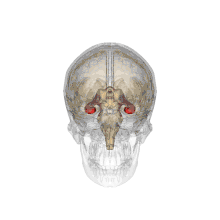hippocampus
See also: Hippocampus
English

Hippocampus animation (anatomy)
Etymology
From Late Latin hippocampus, from Ancient Greek ἱππόκαμπος (hippókampos), from ἵππος (híppos, “horse”) and κάμπος (kámpos, “sea monster”).
Noun
hippocampus (plural hippocampi)
- A mythological creature with the front head and forelimbs of a horse and the rear of a dolphin; a hippocamp.
- (anatomy) A part of the brain located inside the temporal lobe, consisting mainly of grey matter. It is a component of the limbic system and plays a role in memory and emotion. So named because of its resemblance to the seahorse.
Abbreviations
- (neuroanatomy): HIPP
Derived terms
Translations
mythological creature
brain region
|
Latin
Alternative forms
Etymology
From Ancient Greek ἵππος (híppos, “horse”) and κάμπος (kámpos, “sea monster”).
Pronunciation
- (Classical) IPA(key): /hip.poˈkam.pus/, [hɪp.pɔˈkam.pʊs]
Inflection
Second declension.
| Case | Singular | Plural |
|---|---|---|
| Nominative | hippocampus | hippocampī |
| Genitive | hippocampī | hippocampōrum |
| Dative | hippocampō | hippocampīs |
| Accusative | hippocampum | hippocampōs |
| Ablative | hippocampō | hippocampīs |
| Vocative | hippocampe | hippocampī |
References
- hippocampus in Charlton T. Lewis and Charles Short (1879) A Latin Dictionary, Oxford: Clarendon Press
- hippocampus in Gaffiot, Félix (1934) Dictionnaire Illustré Latin-Français, Hachette
- hippocampus in Harry Thurston Peck, editor (1898) Harper's Dictionary of Classical Antiquities, New York: Harper & Brothers
This article is issued from Wiktionary. The text is licensed under Creative Commons - Attribution - Sharealike. Additional terms may apply for the media files.